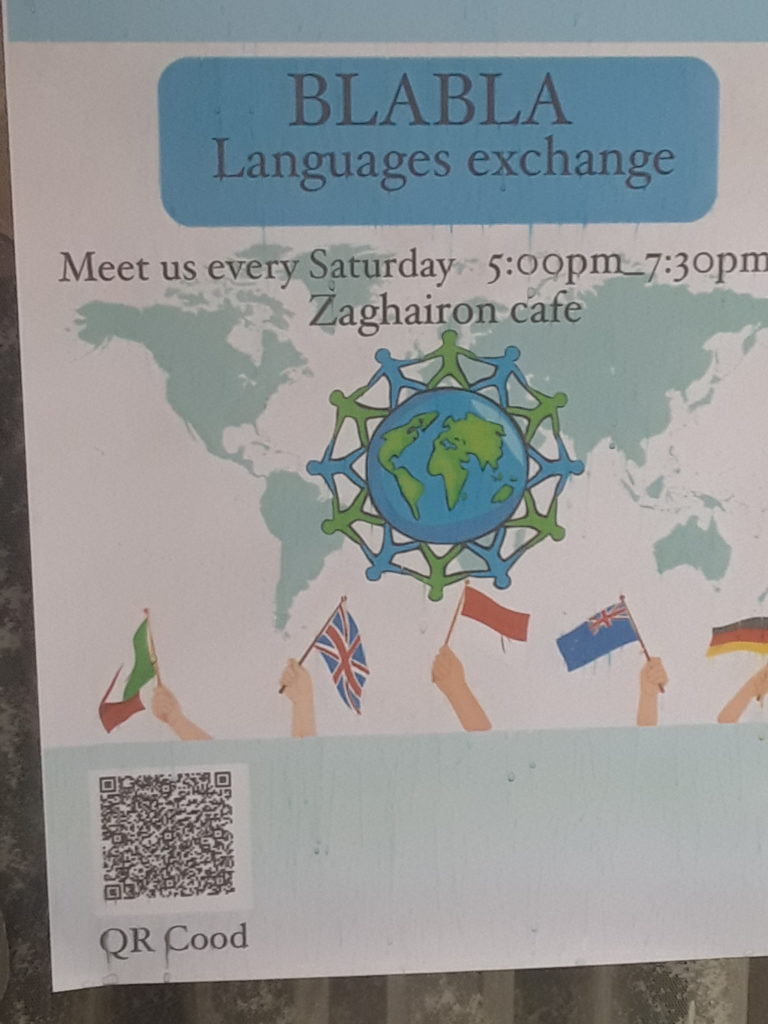In my first ever blog post, I promised that I would make a “Learn Arabic” playlist. For all the folks who’ve been waiting on the edge of their seats (joke), it’s finally here!
I’ve been working hard on my Arabic, and in this post I want to give you a little glimpse of the craziness that is my attempts to practice the language.
Language Exchange
I burn for the breath,
Vega, Samuel. “Treatment Plan.” Lines 6-9, Cultureworks, 2023.*
for the bridge between bloodlines,
for the bonds between boulevards.
I yearn for a newer and more vivid link.
I found out about a group called BlaBla Language Exchange through a flyer taped to a cafe wall in Al Weibdeh. The premise of the group is practicing languages in small groups of language learners and native speakers.

The first time I went to BlaBla I did the natural thing and sat at the table that was half in English, half in Arabic. Did I understand the English? Yes. Did I understand the Arabic? No. But I enjoyed the vibe of the group and I was excited to go back.
The second time I went, I had a bright idea. What if I combined my desire to learn Arabic with my desire to keep my Spanish conversation skills fresh?!
This is how I ended up at a table that spent half the time in Spanish and the other half in Arabic, neither of which am I even remotely fluent in. This is also how I absolutely overloaded my brain’s language processing system. Here’s a small sample of how the conversation went:
Nice person: “Cómo te llamas?”
Me: “Huh?”
Nice person (louder): “CÓMO TE LLAMAS?”
Me: “Ana isme, oop sorry, asifa, I mean, AnnaLeah.”
Nice person: “What?” (Notice how they kindly switch to English at this point. Props for being able to speak like four languages perfectly. Not that I’m jealous or anything.)
Me: “AnnaLeah.”
Nice person: “Mucho gusto, AnnaLeah. De dónde eres?”
Me: “Soy de Amreeky.” (This is not an answer to the question in either Spanish or Arabic. In Arabic Amreeky means American, the nationality, but it is a masculine word, so it doesn’t work if I’m describing myself.)
Me (trying again): “I mean, umm, los, umm, America?”
Nice person: “Los Estados Unidos?”
Me: “Yeah, sí, sí, sí, sí. Shukran. Gracias.” At this point I decided it would be better for me to listen than to speak. Unfortunately, everyone in this group is very friendly, and I had to repeat basically this exact same conversation as every person arrived and introduced themself.
As if this was not enough, one of the conversation prompts the group discussed over the course of the evening was how to say the word “kindness” in other languages. Suddenly group members started whipping out Russian, Turkish, and French. Cue me realizing that I know so very, very little. And also that this group is, quite literally, kind and welcoming in too many languages to count. Voy a regresar—yanni, I’ll definitely be back.
Falafel
At BlaBla I gained many snippets of language knowledge that I would never have found out in a formal class. One such snippet was that Jordanians call tightly curled hair “falafel,” although no one at my table was sure exactly why.
Only at BlaBla would I be able to meet someone called “Mohammedito,” or listen to new friends switch seamlessly between Arabic, Spanish, and English to make sure that everyone at the table is included in the conversation. After the end of the scheduled conversation, I stayed to talk for a few more minutes, and I loved seeing connections form as we found commonalities in our ideas about poetry and politics.
When someone asks me how studying Arabic is going, my answer is usually shway shway: slowly. But maybe the pace isn’t the problem. As I slowly pick up more words and grammar, I am also meeting wonderful, interesting, kind people and expanding my view of the world. Isn’t that what learning is really all about?
Answer, if you hear the words under the words—
otherwise it is just a world with a lot of rough edges,
difficult to get through, and our pockets full of stones.
Nye, Naomi Shihab. “The Words Under the Words.” Words Under the Words: Selected Poems, Far Corner Books, 1995.
*Samuel Vega is a poet and recent Hope grad. If you are interested in reading the rest of his beautiful poem in Spanish and English, “Treatment Plan,” you can find it here.